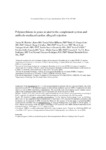Mostrar o rexistro simple do ítem
Polymorphisms in genes related to the complement system and antibody-mediated cardiac allograft rejection
| dc.contributor.author | Marrón Liñares, Grecia Manuela | |
| dc.contributor.author | Núñez, Lucía | |
| dc.contributor.author | Crespo-Leiro, María Generosa | |
| dc.contributor.author | Barge-Caballero, Eduardo | |
| dc.contributor.author | Pombo-Otero, Jorge | |
| dc.contributor.author | Paniagua-Martín, María J. | |
| dc.contributor.author | Suárez-Fuentetaja, Natalia | |
| dc.contributor.author | Cid, Javier | |
| dc.contributor.author | Grille Cancela, Zulaika | |
| dc.contributor.author | Muñiz, Javier | |
| dc.contributor.author | Tan, Carmela D. | |
| dc.contributor.author | Rene Rodríguez, E. | |
| dc.contributor.author | Vázquez Rodríguez, José Manuel | |
| dc.contributor.author | Hermida-Prieto, Manuel | |
| dc.date.accessioned | 2018-04-20T09:19:57Z | |
| dc.date.issued | 2017-07-15 | |
| dc.identifier.citation | Marrón-Liñares GM, Núñez L, Crespo-Leiro MG, Barge-Caballero E, Pombo J, Paniagua-Martín MJ, et al. Polymorphisms in genes related to the complement system and antibody-mediated cardiac allograft rejection. J Heart Lung Transplant. 2018;37(4):477-485 | es_ES |
| dc.identifier.issn | 1053-2498 | |
| dc.identifier.issn | 1557-3117 | |
| dc.identifier.uri | http://hdl.handle.net/2183/20575 | |
| dc.description.abstract | [Abstract] Background. Heart transplantation (HT) is a life-saving treatment for patients with end-stage heart failure. One of the main problems after HT is the humoral response termed antibody-mediated rejection (AMR). Complement activation plays a key role in AMR contributing to graft damage. The aim of this study was to analyze genetic variants in genes related to the complement pathways that could be associated with the development of AMR. Methods. Analysis of 51 genes related to the complement pathway was performed by next-generation sequencing in 46 HT recipients, 23 with and 23 without AMR. Statistical analysis was performed with SNPstats and R. Results. We identified 2 single nucleotide polymorphisms, 1 in the mannose-binding lectin 2 gene (p.Gly54Asp-MBL2) and 1 in the complement factor properdin gene (p.Asn428(p=)-CFP), that showed significant association with the absence and development of AMR, respectively. Moreover, the presence of the rare allele in p.Gly54Asp-MBL2 control patients correlated with an immunodeficiency of mannose-binding lectin (6.24 ng/ml vs 207.50 ng/ml, p < 0.01), whereas the presence of the rare allele p.Asn428(p=)-CFP in patients with AMR correlated with higher levels of properdin protein (14.65 μg/ml vs 10.77 μg/ml, p < 0.05). Conclusions. AMR is a complex phenotype affected by many recipient factors. Variants in p.Gly54Asp-MBL2 and p.Asn428(p=)-CFP genes, encoding mannose-binding lectin 2 and properdin, may influence the risk of AMR. | es_ES |
| dc.description.sponsorship | Instituto de Salud Carlos III; PI13/02174 | es_ES |
| dc.language.iso | eng | es_ES |
| dc.publisher | Elsevier | es_ES |
| dc.relation.uri | http://dx.doi.org/10.1016/j.healun.2017.07.006 | es_ES |
| dc.rights | Atribución-NoComercial-SinDerivadas 3.0 España | es_ES |
| dc.rights | © International Society for Heart and Lung Transplantation | es_ES |
| dc.rights.uri | http://creativecommons.org/licenses/by-nc-nd/3.0/es/ | * |
| dc.subject | Complement genes | es_ES |
| dc.subject | Antobody-mediated rejection | es_ES |
| dc.subject | Heart transplantation | es_ES |
| dc.subject | Mannose binding lectin | es_ES |
| dc.subject | Properdin | es_ES |
| dc.title | Polymorphisms in genes related to the complement system and antibody-mediated cardiac allograft rejection | es_ES |
| dc.type | info:eu-repo/semantics/article | es_ES |
| dc.rights.access | info:eu-repo/semantics/embargoedAccess | es_ES |
| dc.date.embargoEndDate | 2018-07-15 | es_ES |
| dc.date.embargoLift | 2018-07-15 | |
| UDC.journalTitle | The Journal of Heart and Lung Transplantation | es_ES |
| UDC.volume | 37 | es_ES |
| UDC.issue | 4 | es_ES |
| UDC.startPage | 477 | es_ES |
| UDC.endPage | 485 | es_ES |
Ficheiros no ítem
Este ítem aparece na(s) seguinte(s) colección(s)
-
INIBIC-ICATC - Artigos [174]






